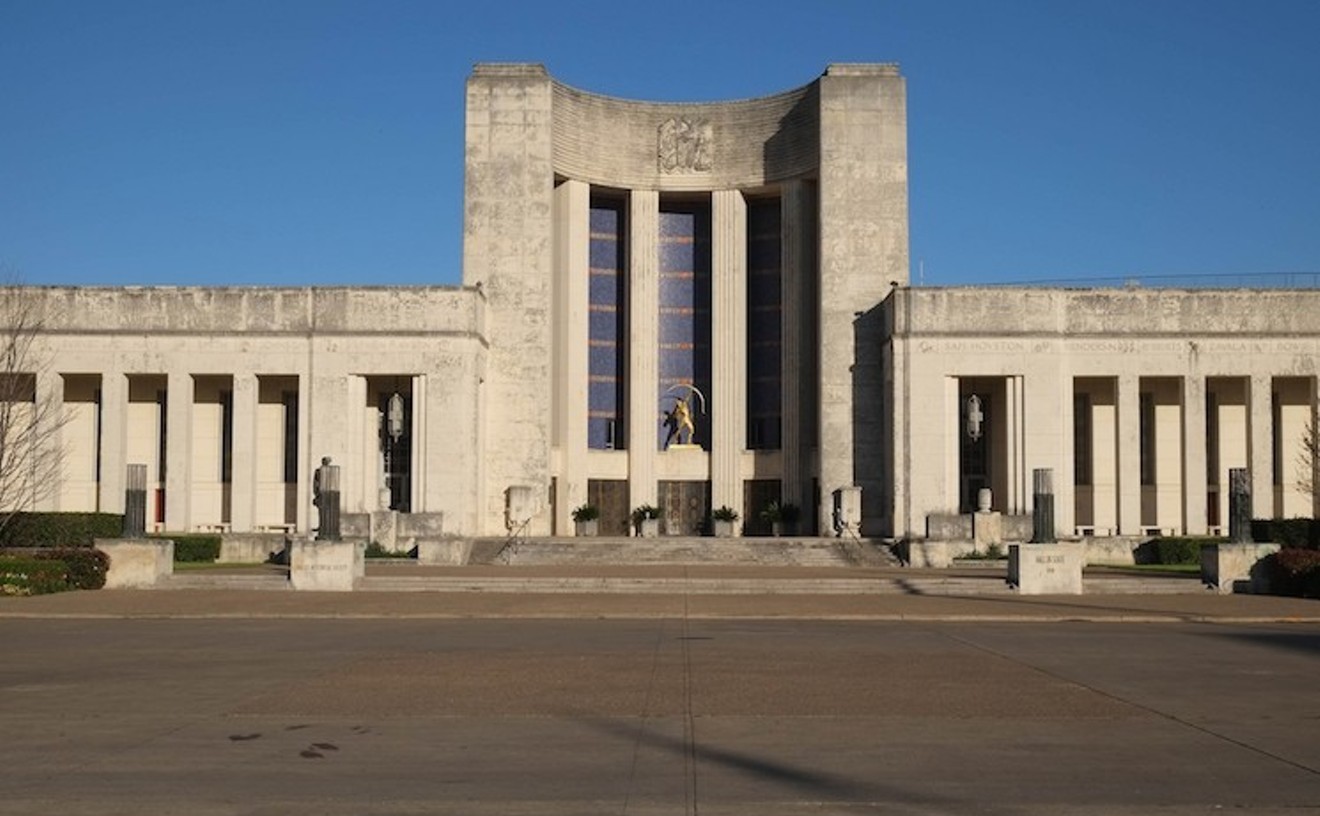For going on 20 years, to build or not to build — that was the question. Now we have an answer. The Trinity toll road, that six-lane behemoth that supposedly would relieve traffic congestion downtown (except it wouldn't), bring $1 billion in state and federal construction dollars to Dallas (not really), improve flood control (nope) and even raise the level of racial equality in southern Dallas (seriously, someone said that) has passed on to its final reward. The fulcrum of Dallas city politics was laid to rest by a City Council vote in August. Let us not mourn the toll road. Instead, shed a tear or two for the editorial writers, the bloggers, the internet commenters, the flacks and pols and consultants who bothered to learn what a charrette was, who educated themselves on traffic flows, toll financing, Alternative 3-C and complicated federal procedures for building a road that's now deader than disco. What on earth are they going to talk about now?
Best $6 Million Worth of Schadenfreude
City Council Votes to Demolish the Standing Wave

Only a particularly crass sort of person — that would be us — could find humor in the knowledge that the city of Dallas will spend $2 million to partially remove the Standing Wave, the pile of concrete that the same people who supported the Trinity toll road decided to toss into the Trinity River to create fake rapids for the entertainment of kayakers. Built for $4 million, the "whitewater feature" opened with much fanfare in 2011 — for one day. The city immediately shut it down when it figured out that its design had the unfortunate, unexpected side effect of likely killing anyone who tried to paddle through the supposedly safe bypass around the rapids. It sat in the river since then, unused, blocking canoeists, filling with silt and creating a slew of finger-pointing and legal threats among city staff until the City Council voted this spring to remove at least enough of the concrete so that canoeing Cub Scouts wouldn't be sent to Davy Jones' locker.
Best Evidence That Money Can't Buy You Love
Philip Kingston Wins Re-election

To hear his detractors tell it, District 14 City Councilman Philip Kingston is a dick. To his supporters, however, Kingston is better known as a dick. He's certainly no friend of Mayor Mike Rawlings, whom he recently called an "overgrown jackleg." (We looked it up. A jackleg is an unskilled, incompetent or dishonest person.) He also called the mayor an "ass-clown." (We didn't have to look that one up.) Kingston's temperament became the cornerstone of a campaign by a super-PAC called For Our Community, which raised more than $200,000 from Dallas' political old guard to support the mayor's allies on the council and unseat Kingston in his race against challenger Matt Wood. The result: The Dick trounced Wood, proving three things: Money isn't everything, East Dallas voters like their politicians to be dickish and Leo Durocher was right — nice guys finish last.
Best Creative Director of a Music Venue
Gavin Mulloy

If you've ever listened to live music in Deep Ellum, chances are you've seen Gavin Mulloy walk through the front door, high-five a few employees, make his way through a sea of drunken fans (never spilling his drink, surely) to the bottom of the stage to let loose with the rest of the crowd. Mulloy knows everyone, and everyone knows him. So who better than him to sell us fun every weekend on behalf of the top two music venues in town? He's creative director for Trees and The Bomb Factory, and you can rest assured he does his part in getting the word out for all the best shows Dallas experiences on a daily basis — including marketing, promotions and creative services. Before his time in Deep Ellum, Mulloy was marketing director for another top venue in town, Granada Theater, promoting bands and designing posters. Mulloy is our ambassador for the Dallas music scene. So the next time you see him at a show, go ahead and give the man a high-five.
Best Table-Turner
HMK Ltd. Beats the Mayor

For months, the drumbeat from Mayor Mike Rawlings and The Dallas Morning News was the same: Khraish H. Khraish and his father, Hanna Khraish, were bad, bad men. They were slumlords whose company, HMK Ltd., was sucking the lifeblood out of the poor who lived in their substandard, low-rent houses in southern and West Dallas. The Khraishes were threatened with millions in fines if they didn't bring their properties up to new, stricter building codes. The focus was particularly on their properties in West Dallas, which, coincidentally, were in one of the fastest-gentrifying neighborhoods in the city. It just so happened, the mayor told the Khraishes in a meeting they secretly recorded, that the mayor knew some guys who might be willing to take the substandard houses off their hands, all aimed at the goal of increasing private (wink-wink) homeownership in West Dallas. Sure, some 300 poor families might end up on the streets, but you can't make an omelet, you know ... . It's too long a story to recount here, so let's skip to the end. The Khraishes stopped renting homes that can't affordably be fixed up, laid out a plan for redeveloping new affordable housing and self-financed the sale of more than 100 of the other houses to their current residents at rates that put their mortgages roughly the same as their rents. The League of United Latin American Citizens commend Khraish Khraish — not the mayor — for his work in creating homeownership among the working poor.
Best Neighborhood
Lakewood

We're declaring it now: out with Highland Park and in with Lakewood. Well, Highland Park might not be out, but Lakewood is definitely in. Whether you are a single person looking for a good time with a hopping nightlife or someone looking to settle down and find a nice school district to raise your babies in, Lakewood has it all. There's the Dallas Arboretum, White Rock Lake, the Lakewood Shopping Center, and plenty of restaurants and bars to keep you happy. Of course, if you can afford to live in Lakewood, you should be pretty happy already.
Readers' Pick: Deep Ellum
Best Girl Power
Solar Preparatory School for Girls, DISD
Did you start your school day with a choreographed routine to a Justin Timberlake jam, an empowering pledge that starts out with "I believe in myself; I play big; I refuse to let anyone define me" and a dedicated time for fostering positive relationships among students? Us neither, but if you think it sounds awesome ... it is. Dallas ISD's Solar Preparatory School for Girls kicked off with kindergarten, first grade and second grade last fall (it'll add a grade level each year, through eighth grade) and the little girls that skip through the former James B. Bonham campus get things done. The curriculum is STEAM focused: You'll find pig-tailed kiddos coding, engineering lemonade stands and planning guerrilla art projects — and that's before lunch. There's also an emphasis on socio-emotional learning, allowing girls space to build self-esteem and support each other. The mean girl ethos that can so easily upend female confidence is not a thing here. Instead, girls focus on the Solar Six: curiosity, self-awareness, empathy, humility, leadership and grit. In the hallways and classrooms of Solar Prep, there's a joyful and palpable energy among the diverse students. It's like they know that someday, they're gonna run this motha.
Best Gallery for Local Artists
Kettle Art Gallery

Since 2005, Kettle Art Gallery has given Dallas-based up-and-coming artists a place to let their work shine in a city synonymous with stuffy art galleries and constant importing. In the heart of Deep Ellum, Kettle is by artists, for artists, and a place for the underrepresented to feel acknowledged. "Godfather of Deep Ellum" Frank Campagna owns the volunteer-run gallery that first opened its doors when Deep Ellum's popularity and revenue were at a standstill. His persistence and dedication to the job and the gallery's mission to be a welcoming venue for area artists of all styles make Kettle Art Gallery the top locally driven arts destination.
- 2650-B Main St, Dallas, 75226 Map
- 214-573-7622
- www.kettleart.com
Best Hire
Dallas City Manager T.C. Broadnax

He started the job only in January, so maybe nine months is a little premature to make this call. But so far, T.C. Broadnax, former city manager of Tacoma, Washington, has yet to make any splashy headlines. By Dallas standards, that's a pretty good record for a city manager. There've been no reports of secret deals with drilling companies to plant rigs in city parks. No conspiracies with cab companies to use the cops to harass ride-sharing outfits. No major audits under his watch showing that scads of money have disappeared into the ether. No one's tried to gin up fake felony charges against sitting City Council members. The tide of bullshit flowing from City Hall has abated somewhat. In fact, things have been remarkably quiet under Broadnax's leadership. Maybe too quiet. Uh-oh.
Best About-Face
City Attorney Larry Casto Reverses Fair Park Decision

The deal was all but done. Under a plan pushed by Mayor Mike Rawlings, the City Council looked set to hand over management of Fair Park, home of the State Fair of Texas and one of the largest collections of decrepit Art Deco buildings in the country, to a private entity led by the mayor's pal, Walt Humann, along with $20 million a year in city money to Humann's group, the Fair Park Foundation. Dallas was between city attorneys at the time, and the interim city attorney signed off on the deal. Then two things happened: Dallas got a new city attorney, Larry Casto, and mayoral adversary, lawyer and all-around sweet guy, City Councilman Philip Kingston, asked a question. Can the city really just hand over a major hunk of city property without seeking competitive bids? Casto had an answer — and a pair of big ones, considering the way City Hall works: No, it can't. The city has to put out a request for proposals for bidders if it wants to hand management of the 277 acres of city property over to a private entity. That opens the door for other groups to bring fresh ideas for rebuilding the park in a way that might help lift the blighted South Dallas neighborhood around it. If that happens, and that's a pretty big if, whichever group wins the bid can erect a small bronze plaque commemorating Larry Casto in some corner of the park.






